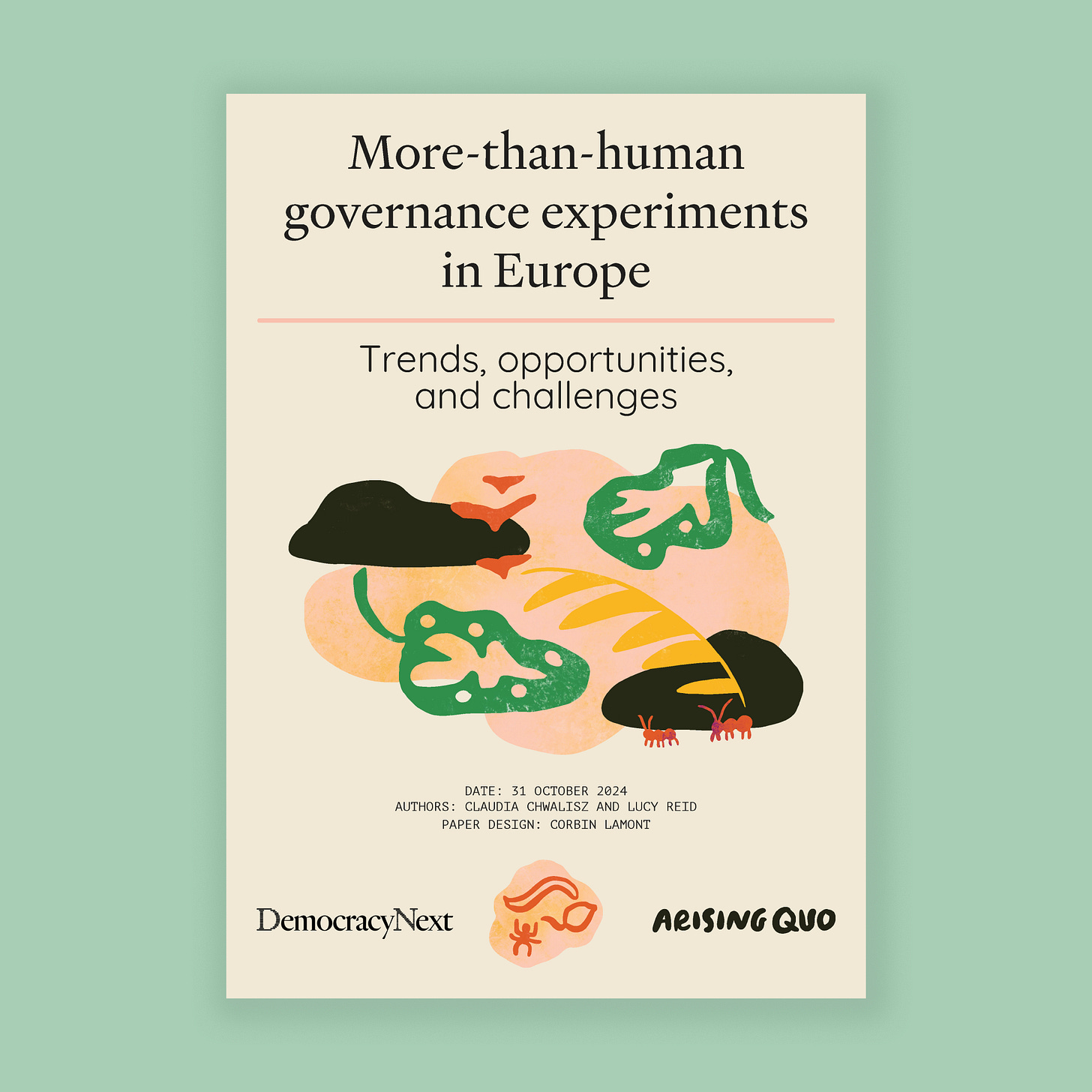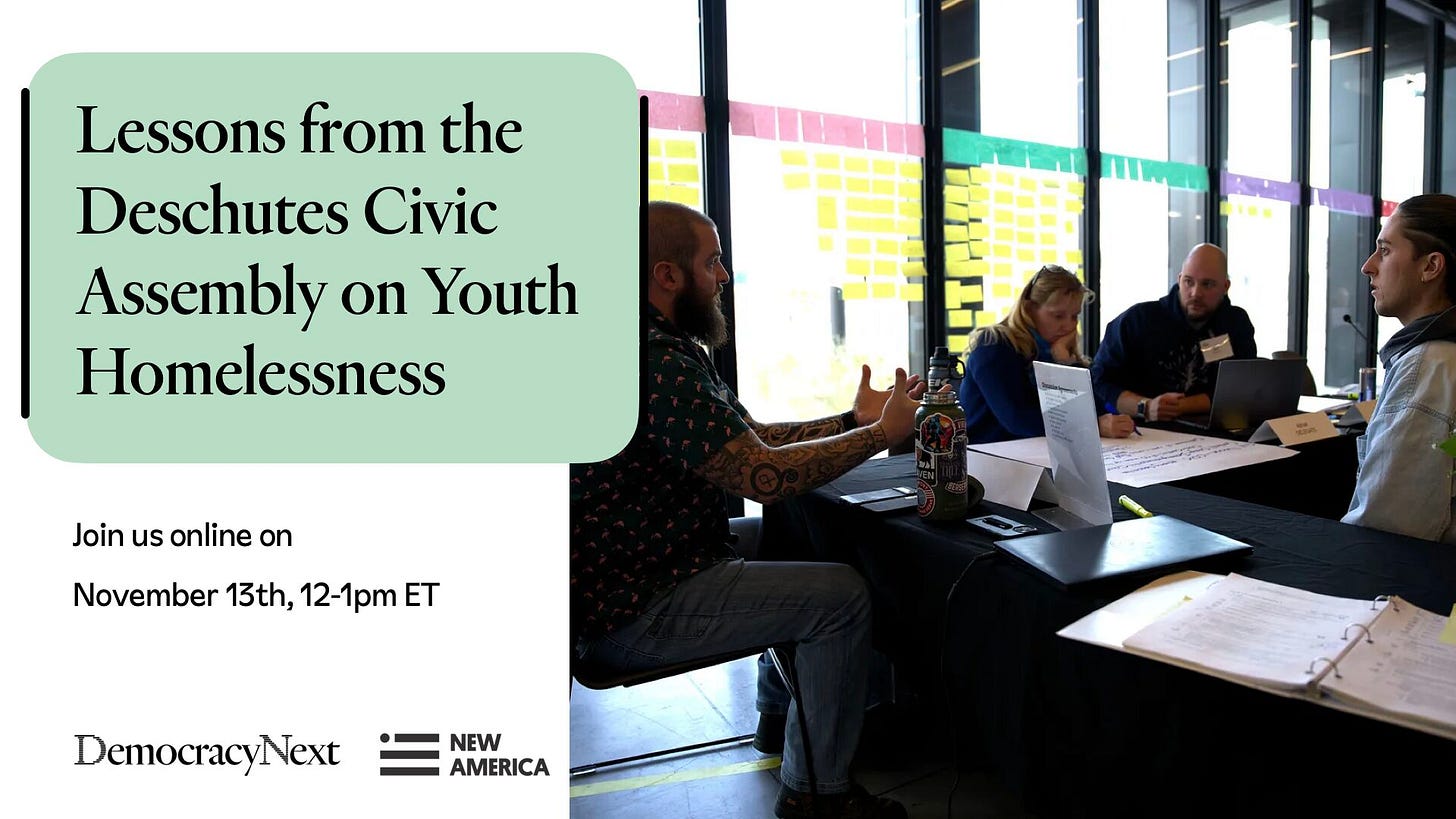🦋 New paper: More-than-human governance experiments in Europe
What if we lived in a world where all living things contributed their intelligence to the decisions made about our futures.
There is a growing network of people and places exploring and practising how governance and policy design can draw on more-than-human intelligences.
Various degrees of legal status have already been granted in recent years to several rivers, forests, mountains, lakes and lagoons in New Zealand, India, Sweden, Spain and other countries. But there is little consensus on what kind of representation works best, or what purposes should be prioritised if we are to include the rest of the planet in our decisions.
In June, DemocracyNext and Arising Quo convened twenty thinkers, policymakers, and activists to debate Europe's still evolving contribution to this important idea – organisations like Embassy of the North Sea, Animals in the Room, Moral Imaginations, and the European Union. This month, with our eyes anxiously on the debates at the United Nations COP29 climate gathering in Azerbaijan, we'd like to share the paper in which we describe the preliminary signposts we found for future directions to take.
The term ‘more-than-human’ was initially coined by David Abram in his 1997 book The Spell of the Sensuous. For him, this referred to the animate earth and the impossibility of separating our humanness from our relationship with it.
We found that today there are in practice three, sometimes overlapping, approaches to “more-than-human” governance: rights-based, representation-focused, and artistic. Beyond that, our discussions determined that our workshop was best dedicated to a mapping of an evolving territory than trying to reach any firm conclusions.
Even in such a small group, many of us shared perspectives and work which the others had not yet heard of. Any future discussions, we felt, should be of an interdisciplinary nature and not try to establish a narrow “field”. We agreed that some voices we needed to hear more from were from indigenous groups, artists, non-specialists, critics and people using technology in novel ways that reshape our relationship with the natural world.
We are at the beginning of a long journey. A start can be made with our founder Claudia Chwalisz’s exploratory paper. We are collecting a list of key organisations and questions for further research on a project page here, along with related papers, books and other resources. And when we've decided on our next steps, you'll read it here first!
➡️ Read the executive summary and full paper by Claudia Chwalisz and Lucy Reid
📡 What’s on our radar
🇵🇰 We were fascinated by this account from Jamaima Afridi in Asia Democracy Chronicles about how a Pashtun civil rights group in Pakistan overcame deadly problems to hold a Pashtun National Jirga that tackled problems from land grabs to targeted killings – and came up with 22 proposals.
🌳 It's all about the impact strategy! Graham Smith of the University of Westminster says such planning is the key to success in designing a citizens’ assemblies on climate. You can hear why on this Journal of Deliberative Democracy podcast with Iswe Foundation's Canning Malkin. Check out Prof. Smith's new book too: We Need To Talk About Climate: How Citizens’ Assemblies Can Help Us Solve The Climate Crisis.
📳 Is technology helping, hindering or burying democracy? We were intrigued as Alex Parsons and MySociety explained what they call Pro-democracy Tech. In a future edition of the newsletter, we will be talking to our International Advisory Council Member Marietje Schaake about her important new book The Tech Coup: How to Save Democracy from Silicon Valley.
📚 Talking of books, we're looking forward to digging into this one: Lottocracy: Democracy Without Elections, by Alexander Guerrero of Rutgers University. It promises to “present a case against … the use of elections to select political representatives … [and to introduce] a new kind of political system with a very different heart: a system that uses random selection.”
🇺🇲 Democratic winds are indeed blowing stronger. Whatever anyone thought of the US election season, we were tickled by Daniel Pink's voting day commentary in the Washington Post: Why not select members of Congress by lottery? Fairness might mean skipping elections in favor of a ‘lottocracy.’ Well, depending on how it's done: yes, exactly.
🍂 Upcoming events and collaborations this autumn
November:
13th: Sign up to join DemocracyNext and New America for a briefing about the Deschutes, Oregon citizens' assembly on youth homelessness held in September-October. We will also discuss the technological innovations that enhanced this assembly at 1-2pm ET.
21st: Publication of DemocracyNext's Senior Adviser Ieva Česnulaitytė's new paper on "A New Democratic Response to Authoritarianism in Central and Eastern Europe", which tracks the encouraging new wave of citizens' assemblies in the region. Register here to join Ieva and our expert guests to hear more about her findings at 10.00am ET | 4.00pm CET | 5.00pm EEST.








Thank you.
I would like to know more of how Deliberatibe Democracy could transparently repair international relations failure to stop wars that you don't ignore. This diverse Planets life is in need. Balancing AI bais from start to finish is vital